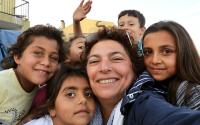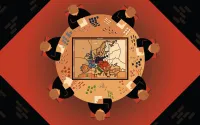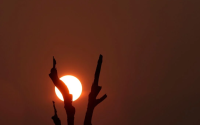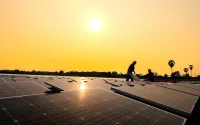by Christopher Allbritton | |
The sand along the public beach in south Beirut is blackened and stained. The sea, normally a rich azure, is a noxious yellowish green. The water reeks of petroleum. All the fish are dead; there is not a single bird in the sky.
And it's getting worse. Some of the oil has washed up on the Lebanese shoreline or sunk to the seabed in a layer up to 4 inches thick, according to a video shot by Lebanese divers and released by Greenpeace. Byblos, a UNESCO World Heritage site 22 miles north of Beirut, is a pretty tourist village with remains dating back 7,000 years that is considered by some scholars to be the oldest continuously inhabited city in the world. Seafood restaurants that depend on the sea for fresh fare rim its harbor, which is dominated by a 13th century Crusader castle. But the harbor is now an oil sump, with thick black liquid leaving its mark at the waterline on the stones of the castle. Just down the coast, Eddé Sands, one of the most popular beach resorts in the region, is closed until next summer -- a crushing blow for a tourism-based economy. In the Palm Islands Nature Reserve just off the coast near Tripoli, nesting grounds for sea turtles have been inundated with oil. The turtles had already laid their eggs by the time the Israelis began bombing. When the baby turtles hatch, they will have to crawl through an oil slick to get to the water. "We've never had an environmental disaster like this in Lebanon," said Tarek Moukkaddem, a volunteer from Tripoli who had come to help clean up the Beirut beaches. He and his friend, Alan Alameddine, were taking a break from shoveling sand into large piles on Ramlet al-Baida, a public beach on the southwest flank of the city. Beside them, a large bulldozer stood idle. Moukkaddem said volunteers and environmental groups such as Green Line had encountered nothing but obstacles from the Lebanese Environment Ministry. The ministry has only just begun issuing permits needed for cleanup projects to begin, and it had not yet sent its own employees to help get the job done, Alameddine said. The work is backbreaking and urgent. Almost no action was taken while the war continued, and the oil has coated the coastline for miles, killing marine life and turning beaches into health hazards. As oil emulsifies, it becomes more viscous and harder to recover from sand and soil. Tidal action is depositing oil farther from the waterline. "I was down on the coast here in Beirut," Professor Rick Steiner, from the University of Alaska Marine Advisory Program, who was advising the Ministry of the Environment, told Reuters. "Everything on it -- limpets, invertebrate fauna, algae, fish, crabs, mussels -- it was all dead." Ministry spokeswoman Ghada Mitri blamed the Israeli attacks and continuing sea blockade for the delay in getting the cleanup started, adding that extensive study, including aerial surveys, was needed before work could get started. "Lebanon is still under siege," said Mitri. "We need permission for any movement." The Israelis gave the United Nations permission Aug. 21 -- a full week after the cease-fire went into effect -- to conduct aerial surveys of the damage. Nick Nuttall, a spokesman for the U.N. Environment Program, said a team in Beirut was planning to do three or four flyovers to get a better idea of where the oil is. He said the current best guess is that 20 percent has evaporated and 80 percent has washed up on Lebanon's shore, sunk to the sea bottom or remained suspended in the water. "It's pretty unprecedented for an oil spill of this size to wait so many weeks before actions had been taken," Nuttall said. The ministry estimates it will cost $150 million over the next year to clean up the spill. Mitri defended the decision to delay beginning the cleanup on grounds that it took until Thursday to arrange a place to store the oil and dirty sand that would be recovered. And because of the Israeli bombing, many roads and bridges in the country had been destroyed, she added. "Do we have the resources, do we have the people, the space, the roads, the tractors and trailers and (trucks) to move all this stuff around?" she asked. She admitted that the ministry was overwhelmed by the scale of the disaster and that "getting everything up and running is taking time." The delay is infuriating environmental groups, which see the need for urgent action. "Every day we lose, part of the oil will not be recovered, and it will enter the food system and the marine life," said Wael Hmaidan, coordinator for Green Line's Oil Spill Working Group. Steiner said, "It appears that the marine and coastal ecosystem is more contaminated than first thought." He has advised governments on oil spills, including the Exxon Valdez disaster in Alaska, and he told Reuters news service that this spill was one of the worst he'd seen. He has put together a cleanup plan divided into three phases. A rapid-response plan for the rest of August would focus on shoreline cleaning at Byblos, Ramlet al-Baida, the area around Jiyeh and the Palm Island reserves. The rest of 2006 and 2007 would be concerned with expanded beach cleaning, including rock washing, an effort to remove any recoverable oil on the sea surface. The final phase would address seabed contamination. The health effects of the spill could be dire. Thousands of families on the Lebanese coast depend on fishing for their primary food supply, but surviving fish may contain hydrocarbons and other carcinogens. The economic effects of the spill go far beyond the immediate coastline. More than 1.6 million tourists had been expected to visit this year -- bringing in $4.4 billion, said Tourism Minister Joe Sarkis. The economy had been growing between 5 and 6 percent because of the tourism boom. "Unfortunately, the war stopped everything," he said. Tourism accounts for about 12 percent of Lebanon's economy, and seaside resorts and restaurants accounted for more than half of that. "Without the sea, it would reduce the attraction of Lebanon," Sarkis said. "It might take between one and two years to clean." Lebanon has about 200 beaches and all have been affected, he said. He said resorts such as Eddé Sands and the Movenpick, both of which declined to comment for this article, have all been affected, and many will remain closed for an unknown period of time. "Over the longer term, one year, two years, three years, unless this is cleaned up, unless the oil is taken out of the sand and pebbles, there's always going to be a question mark as to whether this is a holiday destination spot to go to," echoed Nuttall of the United Nations. At a meeting in Athens on Aug. 17, the International Maritime Organization and the U.N. Environment Program agreed to spend an initial $64.4 million on cleanup and containment of the spill. Nuttall said equipment from Spain, France and other countries bordering on the Mediterranean was en route to the spill region. And Green Line has finally gotten permission to start the cleanup at Ramlet al-Baida. Hmaidan said they were able to bulldoze the sand into piles ready to be trucked away by the ministry. From there, Mitri said, the sand can either be reused in another industry, stored or cleaned and returned. The latter is the preferred solution, but she said the equipment and expertise do not exist yet in Lebanon. "The beach is bad, but this is the case with 100 kilometers (62 miles) of Lebanese coastline," said Hmaidan. "This is the biggest environmental disaster in the history of the eastern Mediterranean." |
An Environmental Disaster Emerges on Lebanon Coast
29 Ağustos 2006
-
Aa
+
a
a
a
 An oil-covered crab at Tabarja, north of Beirut, is among the wildlife casualties resulting from the enormous spill. (Greenpeace photo by Jeroen Oerlemans via Reuters)
An oil-covered crab at Tabarja, north of Beirut, is among the wildlife casualties resulting from the enormous spill. (Greenpeace photo by Jeroen Oerlemans via Reuters)





